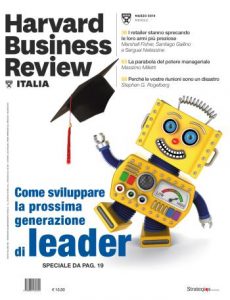
TAD – Advanced Questioning Technique
11 April 2019
The algorithm of emotions
13 May 2019It is difficult to address the topic of leadership without evoking the word “power”, just as it is difficult to remove from a widely shared imaginary the idea of the leader as a “strong” figure (with all that these two concepts drag on). By stating this, we certainly do not wish to allude to some intrinsic virtue in the opposite concept of weakness, but rather to attempt to modify a vision, too often banally stereotyped, of what we define as ‘strong’.
Few concepts help us modify the idea of strength for the better than that of resilience. In physics and engineering resilience denotes the ability of a material to return to its initial state after suffering a shock. The term is derived from the Latin verb ‘resalio’, which some relate to the act of climbing back into a boat capsized by the force of the sea. There is a phrase by Ernest Hemingway that represents this concept very well: ‘Life breaks us all, but only some become stronger in the places where they are broken’.
Being resilient therefore means looking at strength in a different way, tapping into a more articulate and complex way of thinking that contemplates the existence of limitation and the possibility of failure. Facing difficulties with a positive mindset, moving forward despite crises, through a path that allows the construction, indeed the reconstruction, of a new life balance. This is a highly valuable skill that draws its resources from an ‘intelligent force’. Recent studies seem to confirm the research conducted at Berkeley by psychologist Dacher Keltner, who had coined the term ‘power paradox’.
Keltner had noted how, over time, the exercise of power tends to make people lose some of the qualities that enabled them to obtain it. In particular, he had found a limited ability to empathise with the people they were in relationship with and to be able to understand what they were feeling. These insights were confirmed by Sukhvinder Obhi, a neuroscientist at McMaster University in Ontario, who conducted a series of experiments using the Transcranial Magnetic Stimulation (TMS) technique, through which he was able to ascertain that exposure to power impairs the functioning of certain brain structures, the mirror neurons, which are known to underlie our empathic capacity.
Today, fewer and fewer people are willing to accept being guided by authoritarian methods, society has changed, educational models within families have changed. We have spent many words trying to make people understand the difference between authoritarianism and authority, and we can say that this is largely understood and shared. Imagining a resilient leadership therefore means letting ourselves be guided by a model more in tune with people’s expectations and desires. We have abandoned the certainties of the past, many indicators tell us that we will have to face an uncertain and complex future, marked by profound changes. The values and skills that inspire resilience help us to look at all this with greater confidence. Let us therefore try to summarise some of the most important qualities that should inspire resilient leaders (and organisations):
– Reflexivity: the resilient person manifests calmness, lucidly assesses the situation, is able to think even under pressure.
– Flexibility/Creativity: the ability to step outside the box, look at reality with different eyes and learn from mistakes.
– Confidence: in oneself and in others. Never letting yourself be overwhelmed by events, facing adversity with motivation, convinced that you can find a solution.
– Empathy: learning from others, through observation, listening and emotional exchange.
The combination of these qualities can help leaders to accept even the transitory nature of their role, avoiding the risks of the seduction of power. The most important quality of a leader should be to know how to develop people. As far back as the sixth century B.C. Lao Tzu stated that the best leader is the one whose followers can say: ‘We did it all ourselves’.




